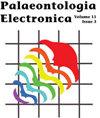巴西三叠纪晚期的斯卡利亚风龙科(Aetosauroides scagliai Casamiquela,1960)头骨骨学:对风龙科古生物学的新见解
IF 1.5
4区 地球科学
Q1 Earth and Planetary Sciences
引用次数: 1
摘要
Aetosauroides scagliai来自阿根廷的Ischigualasto组和巴西的Santa Maria超序(卡尼亚-诺里亚),是最古老的Aetosauria成员之一,Aetosauria是一个多样化的装甲鳄鱼系祖龙分支。scagliai Aetosauroides scagliai与其他aetosaurus的不同之处在于,其上颌骨被排除在外鼻的边缘之外,后颧骨的长/宽比≤0.75,以及其他特征使其成为该分支中最早分化的成员之一。在这篇论文中,我们基于一个新的巴西标本对a . scagliai的头骨进行了详细的描述,揭示了它在上颌骨的内侧表面缺乏一个气动腔,并且与所有其他已知的aetosaurus的不同之处是存在≥12颗直齿。然而,与先前的研究相反,在A. scagliai中,长形的下颌后突确实在腹侧与方形下颌相连,形成了头骨的后腹侧角,就像所有其他直龙一样。scagliai Aetosauroides scagliai具有一些掠食性始祖龙的典型特征(如弯曲的ziphodon牙齿和齿列水平的下颌关节),但它可能是杂食动物,因为它也与一般的aetosaurus(即无牙的前颌和有牙的)和stagonolepidoids(例如,铲子形的鼻子)有一些可能的食草性适应。这表明,至少在它们的进化史早期,这一分支的营养多样性比通常认为的要大。伏尔泰。Programa de Pós-Graduação em Geociênciasa . Bento gonalalves 9500, pracimdio 43127, 91540-000,巴西阿雷格里港。voltairearts@gmail.com Julia Brenda Desojo。División Paleontología维蒂布拉多斯,拉普拉塔博物馆,博斯克大道,拉普拉塔,B1900FWA,布宜诺斯艾利斯,阿根廷;国家调查委员会Científicas y Tecnológicas(调查委员会)。julideso@fcnym.unlp.edu.ar Ana Carolina Biacchi Brust。互联网研究与信息管理中心。罗赖马,1000,74b(3427), 97105-900,巴西圣玛丽亚。anacarolinabrust@gmail.com安娜·玛丽亚·里贝罗。Ciências巴西大自然博物馆- SEMA/RS。萨尔瓦多·弗兰扎拉博士,1427 Jardim botnico, Porto Alegre RS, 90690000 amaria_ribeiro@yahoo.com.br PAES NETO等人:AETOSAUROIDES SKULL 2 Cesar Leandro Schultz。Programa de Pós-Graduação em Geociênciasa . Bento gonalalves 9500, pracimdio 43127, 91540-000,巴西阿雷格里港。cesar.schultz@ufrgs.br Marina Bento Soares。巴西国立博物馆,巴西联邦大学。金塔大道公园(20940-040),巴西里约热内卢,RJ。marina.soares@mn.ufrj.br本文章由计算机程序翻译,如有差异,请以英文原文为准。
Skull osteology of Aetosauroides scagliai Casamiquela, 1960 (Archosauria: Aetosauria) from the Late Triassic of Brazil: New insights into the paleobiology of aetosaurs
Aetosauroides scagliai, from the Ischigualasto Formation of Argentina and Santa Maria Supersequence of Brazil (Carnian-Norian), is one of the oldest members of Aetosauria, a diverse clade of armored crocodile-line archosaurs. Aetosauroides scagliai differs from other aetosaurs in having the maxilla excluded from the margin of the external nares, the length/width ratio of the postzygapophyses ≤ 0.75, and other features that place it as one of the earliest-diverging members of the clade. In this paper we provide a detailed description of the skull of A. scagliai based on a new Brazilian specimen, revealing that it lacks a pneumatic cavity on the medial surface of the maxilla and further differs from all other known aetosaurs by the presence of ≥ 12 dentary teeth. However, contra previous studies, the elongated posterior process of the jugal does articulate ventrally with the quadratojugal in A. scagliai, forming the posteroventral corner of the skull as in all other aetosaurs. Aetosauroides scagliai exhibits some characters typical of predatory archosaurs (like the recurved ziphodont teeth and mandibular articulation at the level of the tooth row), but was probably an omnivore, as it also shares several probable adaptations for herbivory with aetosaurs generally (i.e., edentulous anterior premaxilla and dentary) and stagonolepidoids specifically (e.g., shovel-shaped snout). This suggests that there was greater trophic diversity in this clade than usually recognized, at least early in their evolutionary history. Voltaire Dutra Paes Neto. Programa de Pós-Graduação em Geociências. Av. Bento Gonçalves 9500, Prédio 43127, 91540-000, Porto Alegre, Brazil. voltairearts@gmail.com Julia Brenda Desojo. División Paleontología Vertebrados, Museo de La Plata, Paseo del Bosque s/n°, La Plata, B1900FWA, Buenos Aires, Argentina; Consejo Nacional de Investigaciones Científicas y Tecnológicas (CONICET). julideso@fcnym.unlp.edu.ar Ana Carolina Biacchi Brust. Centro de Estudos e Pesquisas em Direito e Internet. Av. Roraima, 1000, 74B (3427), 97105-900, Santa Maria, Brazil. anacarolinabrust@gmail.com Ana Maria Ribeiro. Museu de Ciências Naturais do Rio Grande do Sul – SEMA/RS. Dr. Salvador França, 1427 Jardim Botânico, Porto Alegre RS, 90690-000 amaria_ribeiro@yahoo.com.br PAES NETO ET AL.: AETOSAUROIDES SKULL 2 Cesar Leandro Schultz. Programa de Pós-Graduação em Geociências. Av. Bento Gonçalves 9500, Prédio 43127, 91540-000, Porto Alegre, Brazil. cesar.schultz@ufrgs.br Marina Bento Soares. Museu Nacional, Universidade Federal do Rio de Janeiro. Parque da Quinta da Boa vista s/n 20940-040, Rio de Janeiro, RJ, Brazil. marina.soares@mn.ufrj.br
求助全文
通过发布文献求助,成功后即可免费获取论文全文。
去求助
来源期刊

Palaeontologia Electronica
地学-古生物学
CiteScore
3.60
自引率
0.00%
发文量
20
审稿时长
>12 weeks
期刊介绍:
Founded in 1997, Palaeontologia Electronica (PE) is the longest running open-access, peer-reviewed electronic journal and covers all aspects of palaeontology. PE uses an external double-blind peer review system for all manuscripts. Copyright of scientific papers is held by one of the three sponsoring professional societies at the author''s choice. Reviews, commentaries, and other material is placed in the public domain. PE papers comply with regulations for taxonomic nomenclature established in the International Code of Zoological Nomenclature and the International Code of Nomenclature for Algae, Fungi, and Plants.
 求助内容:
求助内容: 应助结果提醒方式:
应助结果提醒方式:


